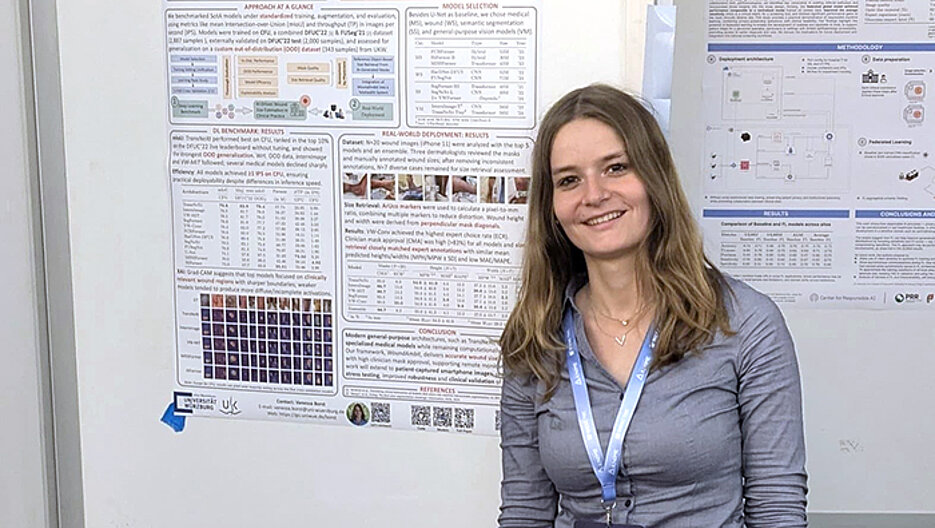Keeping a Permanent Eye on Chronic Wounds with an App
09/30/2025Würzburg computer scientist Vanessa Borst received an award at an international conference - for co-developing a dermatological app for the University Hospital of Würzburg.

Chronic wounds are particularly common in older people. Factors such as diabetes, circulatory disorders or pressure often prevent normal healing, so that the wound remains in a permanent inflammatory or repair stage.
Conventional treatment of such wounds is resource-intensive and requires frequent personal visits to the doctor, which is very stressful for patients who often have limited mobility. An AI app called Wunderkint is now set to provide relief.
"We normally only see our patients at intervals, for example once a quarter," reports Dr Tassilo Dege, who came up with the idea for the app together with Professor Astrid Schmieder and is now clinically supervising the project. This means that only snapshots are ever possible. "Teledermatological care, on the other hand, offers a continuous assessment of the wound and the quality of life of those affected."
Wounds and Quality of Life Continuously in View
Patients can use the app to regularly photograph their wound and indicate the intensity of pain, itching, wetness of the wound and their mood on a scale. To enable the AI to recognise and analyse the size and redness of the wound, a reference card with a colour scale and a marker consisting of black and white pixels is placed next to the wound when it is photographed.
All the data is transmitted securely to the treating doctors, who can access it on a dashboard. This allows them to monitor and assess the progress of the wound or the healing process remotely in real time and adjust the treatment if necessary. Appointments and video consultations are also possible via the app.
PhD Student Vanessa Borst Trained the AI
The idea of automated wound monitoring was realised in collaboration with the Chair of Computer Science II (Software Engineering) at the University of Würzburg. Vanessa Borst, a doctoral student under Professor Samuel Kounev, was responsible for the technical realisation and training of the AI models.
As automatic miracle recognition was still underrepresented in medical imaging, she first compared various deep learning models and fed the AIs with thousands of publicly available wound images. The AI had to recognise which areas of the image belonged to the wound and which did not, so that the shape and size could be precisely determined.
In order to test the reliability of the AI when analysing wound images from the University Hospital of Würzburg, the research team compared the wound areas recognised by the AI with the assessments of experienced doctors - based on a specially created data set from Tassilo Dege. The AI module developed in this way forms the basis for the functionality of the Wunderkint app.
Prize for the Würzburg Computer Scientist
This so-called semantic segmentation then had to be combined with real wound care. "In concrete terms, this means that reliable size information in millimetres or centimetres had to be derived from the wound areas recognised by the AI. Different imaging conditions - such as when the camera is closer to the wound and further away from it - make this conversion particularly challenging," explains Vanessa Borst.
The computer scientist won the "Best Student Paper Applied Data Science Track" at the European Conference on Machine Learning and Principles and Practice of Knowledge Discovery in Databases (ECML PKDD) in Porto (Portugal) in mid-September 2025 for this bridge-building, i.e. the transfer of highly developed AI to practical, understandable and useful care. ECML PKDD is the most important European conference on machine learning and data mining, i.e. the discovery of patterns in large amounts of data.
The Wunderkint App in Practical Testing
An ongoing feasibility study is currently testing the app's suitability for practical use. Initial results show excellent user-friendliness, good acceptance among patients and a significant reduction in the workload of medical staff.
"Personal contact with the doctor should not be underestimated and is probably part of the healing process," emphasises Astrid Schmieder. She sees digitalisation more as an add-on. "Through the app, our patients learn more about their illness and how to deal with it. This gives them the courage, confidence and security to treat the wound properly, which leads to faster wound healing."
The dermatologist and her team are working on digitalisation projects to improve the treatment of various diseases and increase the quality of life of those affected. "In future, we will have digital media that are tailored precisely to our needs," says Schmieder. What she finds particularly exciting about the age of digitalisation is that both medical staff and patients have the opportunity to help shape it.
Vote for Vanessa Borst: IT Women of the Year
Vanessa Borst (28) has been nominated for the Reader's Choice Awards organised by the Women's IT Network (WIN) and the Vogel IT Academy. The awards will be presented at the FIT 2025 Congress on 27 November 2025 in Augsburg. Women from Business IT, eHealth and eGovernment will be honoured in the categories Digital Transformation, Start Up and Leadership.
Click here to vote: https://www.fit-kongress.de/award#Abstimmung - click through to the "Women in eHealth" section and on to the "Young Leader" category. Vanessa Borst can be found there.
"The nomination is not only a personal honour, but also an opportunity to raise awareness of AI applications in medicine that can really make a difference," says the doctoral student happily.






